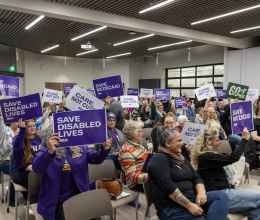A letter sent to Judge Kaufman asserts that recent courthouse practices undermine longstanding constitutional principles and public trust.
DENVER — The ACLU of Colorado sent a letter today urging Assistant Chief Immigration Judge Matthew W. Kaufman of Denver Immigration Court to keep immigration court proceedings open to the public. The letter highlights recent practices by federal agents, private security contractors, and other court staff that obstruct, intimidate, and otherwise restrict attorneys, legal observers, and other members of the public from proceedings.
Specific tactics include:
- Legal observers handcuffed and detained without justification.
- Legal observers denied entry to the courthouse without explanation.
- Immigration judges and courtroom staff preventing attorneys from advising litigants in the courthouse.
- Attorneys interrogated about their relationships with specific people and told they cannot give advisements inside the courthouse.
- Legal observers prohibited from taking notes on their own paper regarding dockets that are publicly posted in the hallways.
- Legal observers silenced in the lobby or hallways, even though quiet and nondisruptive conversation has been permitted for years.
“Restricting and intimidating legal observers, immigration attorneys, and other members of the public is an attack on the rule of law,” said Tim Macdonald, ACLU of Colorado legal director. “It undermines public trust in our immigration courts and further emboldens the Trump administration to continue its reckless anti-immigration agenda.”
The letter alleges that recent practices go against the First Amendment, federal law, and Executive Office for Immigration Review’s own policies. It also asserts that courthouses open to the public are integral to longstanding constitutional principles and democracy itself. Recent immigration enforcement activity, at times encompassing unlawful behavior by federal agents, makes immigration court proceedings of heightened interest to the public.
“The cases heard at immigration court are profoundly consequential, for the families impacted and the general public. Every day, judges decide whether or not to separate families, send people into an increasingly lawless detention system, or effectively banish people to countries they have no memory of,” said Emma Mclean Riggs, ACLU of Colorado senior staff attorney. “This powerful court must not operate in the shadows.”
Find the full letter bellow.


